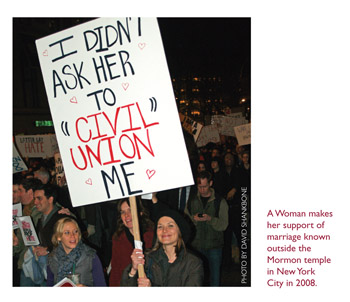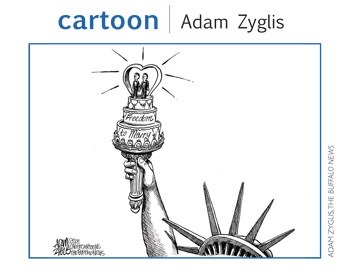Stop Saying “Same-Sex” Marriage
On July 24 New York became the sixth state to offer officially recognized marriage licenses to same-sex couples; but it didn’t recognize same-sex marriage. Why? Because there is no such thing. Though we hear these sexual orientation-oriented matrimonial distinctions ad nauseam; common usage does not confer definition. What saying “gay” or “same-sex” marriage does confer is that the social worth of gay and lesbian individuals is subordinate and inferior to their heterosexual counterparts.
 As humanists, such degradations are not in the complement of our intentional vocabulary. As humanists, we should stop saying “gay marriage” and “same-sex marriage” and call it what it really is: marriage.
As humanists, such degradations are not in the complement of our intentional vocabulary. As humanists, we should stop saying “gay marriage” and “same-sex marriage” and call it what it really is: marriage.
I’m a humanist celebrant who has had the honor of performing marriage ceremonies for both same and opposite-sex couples, and I can tell you that the only essential difference between these unions is the gender combination of the dolls on the cake—that and the harassment and disproportionate difficulties experienced by the lesbian and gay couples from those creating and capitalizing on this issue to suit their own agendas.
So what is marriage? I would define marriage (ideally) as a long-held, established civil institution based upon cultural expectations of long-term (often lifelong) committed monogamy and mutual respect between two non-related adults participating in a mutually consensual intimate relationship. Such a marriage is conjoined by a civilly recognized contract that generally confers civil and social privileges in the form of tax benefits, social security survivor benefits, and so forth. These are the essential elements of the marital relationship. Beyond philosophical abstracts, marriage is a cherished, challenging, and rewarding commitment between two individuals who love each other and who have their relationship recognized by the state for certain privileges and protections. The marriage arrangement is a platform for these two individuals to nurture each other, pursue developing their family and, ideally, to help each other develop into better human beings. Nowhere in that structure is the sex or gender of the participants relevant. What is relevant is the love, mutual respect, care, and commitment between the participants.
In the United States, marriage is universally a civil institution, as evidenced by the paperwork those getting married must all submit to the same place: not the church, but the state. It took us 180 years to dispel legally sanctioned anti-miscegenation with the Loving v. Virginia decision in 1967, overturning Virginia’s Racial Integrity Law (1924), where the biblical reasoning went that God’s intended “natural” racial segregation was being disrupted, which therefore necessitated harassment of interracial couples and the prohibition of them legally marrying. It then took another thirty-six years to nullify sodomy laws. In that 2003 case (Lawrence v. Texas) it was noted that these specifically anti-gay sodomy laws were recent, and that all previous sodomy laws were aimed at all forms of non-procreative forms of sexual encounter. Still, Justice Anthony Kennedy mentioned that the Lawrence court was not considering the right of homosexual individuals to marry each other. Even so, it is a progression, one that is becoming more rapid each day, leading us closer to a time when we’ll look back and see this whole mess for the embarrassment that it is.
We know that homosexuality is neither a disease nor a disorder. We also know that there is no valid secular reason to discriminate against gay and lesbian individuals in the areas of family, marriage, employment, and all other forms of political or social equality. Diminished social worth caused by popular disparaging has far-reaching consequences, including bullying, suicide, employment discrimination, and exclusion from deserved rights and benefits. Same-sex couples demanding deserved state recognition of their spousal relationships aren’t seeking so-called same-sex tax breaks, same-sex hospital visitation, same-sex adoption of their spouse’s children, or (in some cases) same-sex spousal immigration rights. Same-sex couples are only asking for what is deserved, the extensions of these marriage rights that are open to our heterosexual peers.
 We can talk about the nature of reality. We can examine this issue with a critical eye and come to these conclusions of reason, but the problem remains that the perceived inferiority of homosexual and bisexual individuals tends to be a position of the epistemologically theistic. And in some ways, their position is more about misogyny than sexuality. After all, there are only a handful of biblical passages that can be construed as condemning homosexual behavior, but scores demonstrating the diminished worth of women. This being so, homophobia and heterocentrism are not ubiquitous interests for all religious or faith-based organizations. The arguments against a same-sex couple’s right to receive equal marriage all too often come from a Bible draped in a plastic, one-sided American flag. They entail such perennial gems as “Adam and Eve, not Adam and Steve,” and “Love the sinner, hate the sin.”
We can talk about the nature of reality. We can examine this issue with a critical eye and come to these conclusions of reason, but the problem remains that the perceived inferiority of homosexual and bisexual individuals tends to be a position of the epistemologically theistic. And in some ways, their position is more about misogyny than sexuality. After all, there are only a handful of biblical passages that can be construed as condemning homosexual behavior, but scores demonstrating the diminished worth of women. This being so, homophobia and heterocentrism are not ubiquitous interests for all religious or faith-based organizations. The arguments against a same-sex couple’s right to receive equal marriage all too often come from a Bible draped in a plastic, one-sided American flag. They entail such perennial gems as “Adam and Eve, not Adam and Steve,” and “Love the sinner, hate the sin.”
In terms of intellectual currency, this God-in-absentia is no longer paying the bills. We no longer need a god for health and welfare, social order, or the maintenance of the laws of physics (and frankly, we never did). As with the God concept, statistically significant evidence for the efficacy of intercessory prayer is severely lacking (no God, no agency, no reason to continue paying attention). We’ve moved on, no matter how interesting it may be to wax philosophical about God’s attributes.
And so, fundamentally, the religious arguments against recognizing marriage between same-sex couples are not just bad arguments, they’re not our arguments, and they aren’t even worth our time.
So stop saying it. Just stop saying “same-sex marriage.” Doing so brings up the religious connotations of an arbitrary and fictional hierarchy of gender and sexuality. The religious say that things are “sinful” and as humanists we don’t concur—so why should we with this? Accepting marriage as a civil institution, it doesn’t make sense to laden ourselves with these unworkable constructs. Also, as a gay man I find the implication of inferiority by distinction offensive. Simply calling it what it is—marriage—brings us to a point of honesty and openness, and sets a point of departure for discussion. Language has power, and without thinking, our use of these specific terms can cause pain and separation between us and the very people we support. Freethinkers are always at the forefront of pursuits to elevate all of humanity, to achieve equality, and to work for the greater good (which includes happiness). As humanists we must be compelled to actively participate in these endeavors. And while we don’t always have time to write a letter, or a dollar or two to chip in, we do have the ability to do the little things that really matter, and this is one of them. So, once and for all, stop saying “same-sex marriage“ and call it what it really is: Marriage. For all.
